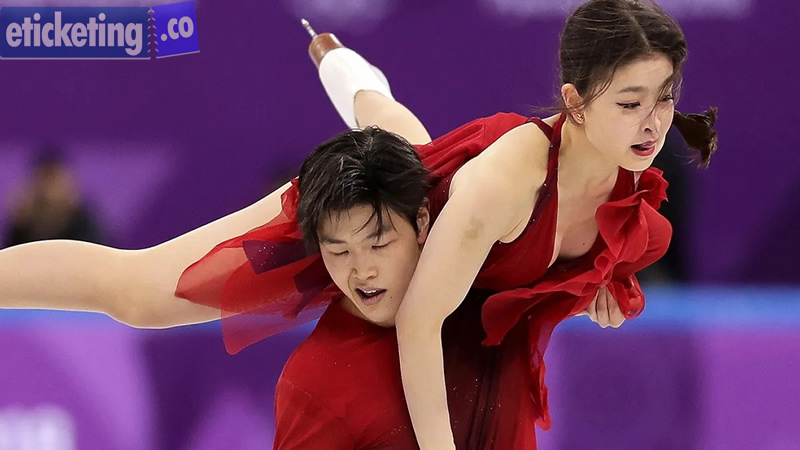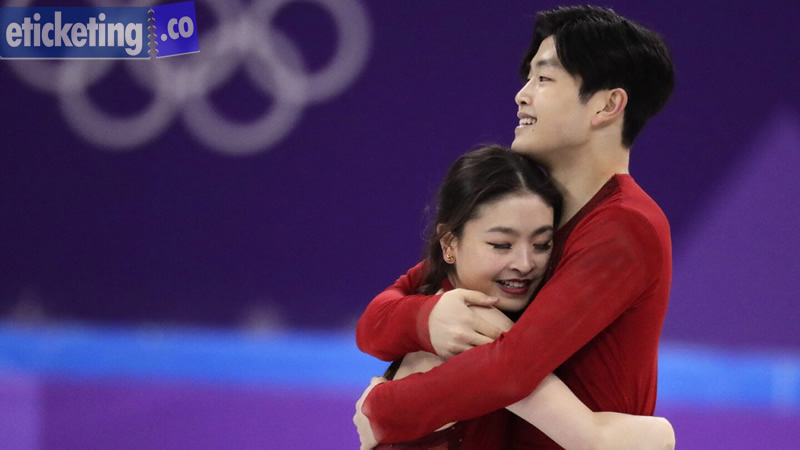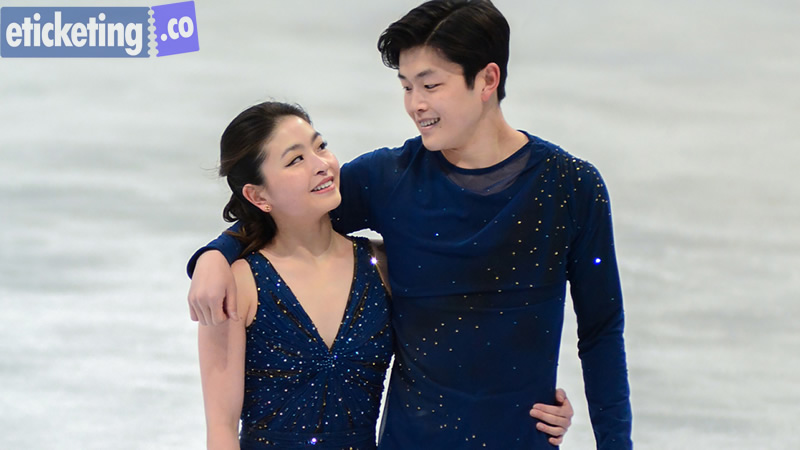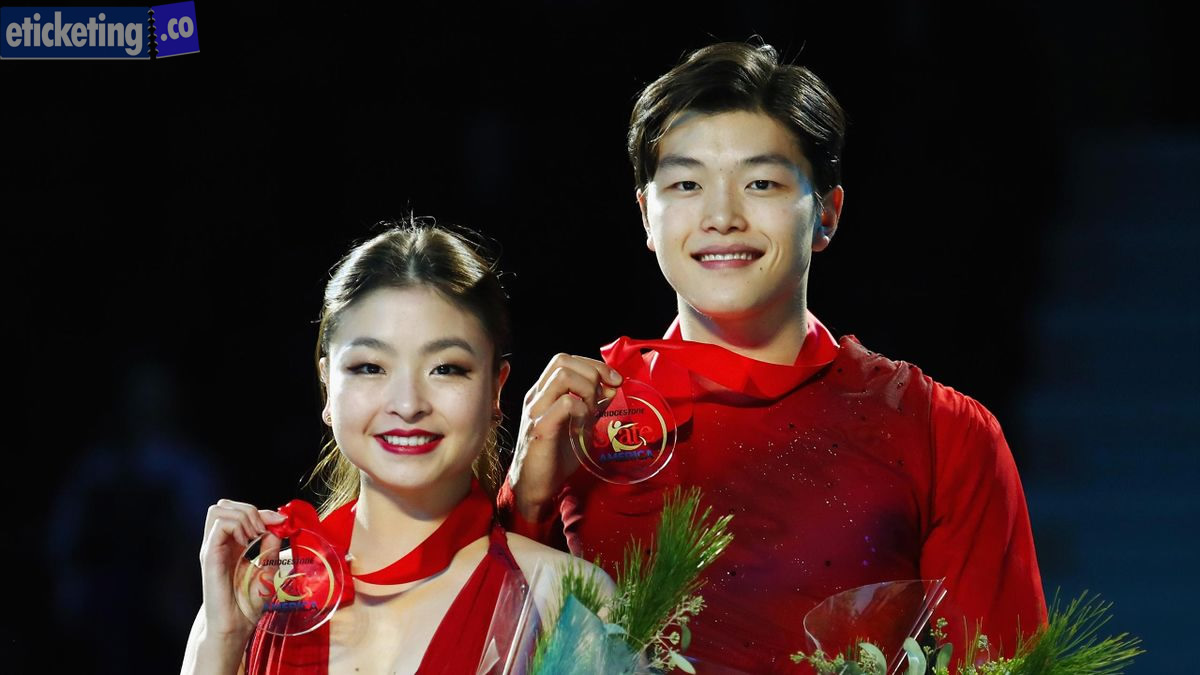When Maia and Alex Shibutani stepped onto competition ice at the 2025 NHK Trophy, seven years after their last appearance as active competitors, the moment felt both surreal and historic. The two-time Olympic bronze medalists, affectionately known as the ShibSibs, returned to the Grand Prix stage not to chase medals or reclaim rankings, but to reconnect with the sport they shaped and inspired for over a decade. Their sixth-place finish was far less important than the significance of their comeback—a testament to their artistry, resilience, and the lasting impact they continue to have on Winter Olympic figure skating.
Olympic 2026 fans worldwide can book Olympic Figure Skating Tickets from our online platforms e-ticketing. co. Fans can book Olympic Tickets on our website at discounted prices. Experience the thrill of the Games in Milano Cortina and support your favorite athletes as they compete for glory.

The Shibutanis last competed in 2018, a season that brought them immense success and equally immense challenges. After the PyeongChang Olympics, both Maia and Alex stepped away from competition, focusing on recovery, personal projects, and advocacy. Maia faced a serious medical battle following a tumor diagnosis, and both siblings found new creative avenues in writing, producing, and speaking. But throughout their time away, they maintained a quiet relationship with the ice—one that ultimately led them back to competition, though on their own terms.
A Return Built on Purpose, Not Pressure
For many fans, the Shibutanis’ announcement that they would compete at a Grand Prix event again came as a shock. Few pairs, especially ice dance teams, return to high-level competition after such a long hiatus. The physical demands, technical evolution, and rule changes within the sport make comebacks incredibly difficult. Yet the ShibSibs approached this return with clarity: they weren’t chasing medals—they were chasing meaning.
Their programs for NHK Trophy were crafted with emotional resonance rather than technical ambition. While they trained diligently to regain the necessary level of conditioning, they made it clear that this comeback was not a full Olympic push or revival of their competitive career. Instead, it was a way to honor their skating journey, celebrate their growth, and reconnect with an audience that has followed them since their junior days. You Can Read Winter Olympic 2026 Loena Hendrickx Reveals at NHK Trophy This Might Be My Last Season
Winter Olympic 2026: Short Dance A Poised and Elegant Return
The moment their music began in the rhythm dance, the arena erupted. Fans held signs welcoming them back, and the atmosphere felt more like a celebration than a typical Grand Prix segment. Maia and Alex skated with poise, charm, and the polished unison that made them icons in the ice dance community.

Their technical content reflected a thoughtful balance—difficult enough to meet Grand Prix standards, yet adapted to their current strengths. In the midline step sequence, they favored lyrical control over sharp aggression, creating a performance that felt deeply musical. Ice coverage and edge quality—long considered their trademarks—remain among the strongest in the sport.
Though they earned lower technical scores than the top teams, the Shibutanis’ component marks highlighted their maturity. The crowd responded with warmth and admiration, applauding not only the performance but the courage it took to return after seven long years.
Free Dance: A Performance of Emotional Depth
Their free dance was a tribute to everything they had experienced off the ice—health struggles, personal transformation, and the shifting meaning of skating in their lives. Skating to introspective, cinematic music, the siblings built a narrative of return, renewal, and connection.
Maia’s lines were elegant and soft, while Alex’s strength and clarity grounded the performance. Their lifts, though simpler than in their peak competitive years, were beautifully executed with fluidity that reflected years of refinement. Their step sequences carried emotional depth rather than athletic aggression, telling a story rather than chasing levels.
Winter Olympic 2026: The Scoring and Final Placement
Finishing sixth at NHK Trophy might seem modest for a team once ranked among the world’s best, but context matters greatly. They competed against athletes who had spent the last seven years immersed in evolving technical requirements, while the Shibutanis stepped away from the intense structure of competition entirely.

Judges scored them fairly, acknowledging their artistry and quality while recognizing that their technical content no longer matched the pace of the current field. Their final placement reflected not a decline, but a shift in purpose: this event was about expression, gratitude, and re-entering the sport on their own terms.
Reactions From the Skating Community
The Winter Olympic figure skating world responded overwhelmingly positively to their return. Fellow skaters praised their ability to perform with warmth and emotion. Coaches and analysts noted that the Shibutanis brought something uniquely valuable to the competition—a reminder that ice dance is as much an art as it is an athletic contest.
Former competitors and current athletes sent messages across social media celebrating their comeback. Many younger teams credited the Shibutanis as inspirations for their own skating careers. For a sport so often focused on technical progression, the siblings’ presence highlighted a broader truth: artistry, connection, and storytelling remain at the heart of ice dance.
Navigating Seven Years Away From Competition
Seven years is an eternity in elite sport. During their time away, the Shibutanis became bestselling authors, creative producers, and advocates for representation and mental health. Maia’s health struggles fundamentally changed their lives, reinforcing the fragility of athletic careers and the importance of honoring one’s body and wellbeing.
Olympic 2026 fans worldwide can book Winter Olympic Tickets from our online platforms eticketing.co Fans can book Olympic Tickets on our website at discounted prices. Experience the thrill of the Games in Milano Cortina and support your favorite athletes as they compete for glory.

Returning to competition required an enormous physical and emotional investment. They needed to regain strength, relearn patterns, re-enter a training rhythm, and incorporate new rule changes. That they were able to accomplish this in such a limited time speaks to their discipline and professionalism. Yet what made the comeback so moving was its authenticity. They did not hide their vulnerabilities. They openly discussed how the return was challenging, humbling, and deeply meaningful.
A New Role in the Winter Olympic Figure Skating Landscape
The Shibutanis’ influence has always extended beyond results. Their return adds a valuable dimension to the 2025–26 season—not as podium contenders, but as veteran performers who enrich the artistry of the sport. Their participation at NHK Trophy demonstrated that competitive skating can be more than medals. It can be a celebration, a comeback, a message, a moment of gratitude.
Winter Olympic Figure Skating: An NHK Farewell or a New Beginning for the Shibutanis
Whether the Shibutanis will compete again remains uncertain. They have not announced future plans, leaving the door open for another competition or special performance. What is clear, however, is that their NHK Trophy appearance was deeply intentional. It represented closure, renewal, and commitment to an audience that has grown with them. If NHK Trophy becomes their final competitive event, it is a fitting one: emotional, meaningful, and delivered with the same sincerity that defined their entire career.
Winter Olympic Figure Skating: The Shibutanis Return to Celebrate Artistry, Connection, and Community
Maia and Alex Shibutani’s sixth-place finish at NHK Trophy is far less important than the story behind it. They returned to the ice not for medals, but for themselves—and for the community that has supported them from the beginning. Their comeback affirmed that Winter Olympic figure skating greatest power lies not in difficulty scores, but in the connection between performers and audience.

Their presence at NHK Trophy was a reminder that some performances resonate not because they win, but because they mean something.
Experience the magic and excitement as fans from around the world gather to celebrate the spirit of the Games. Secure your Olympic Opening Ceremony Tickets now and create memories that will last a lifetime at the unforgettable Winter Olympic 2026.
